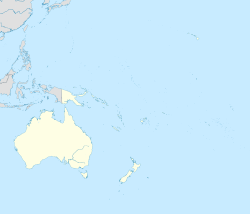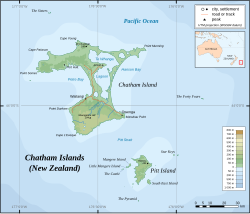Waitangi, Chatham Islands
Waitangi | |
|---|---|
 Town of Waitangi on Chatham Island in May 2008. | |
| Coordinates: 43°57′05″S 176°33′40″W / 43.95139°S 176.56111°W | |
| Country | |
| Territorial authority | Chatham Islands |
| Electorates |
|
| Government | |
| • Mayor of Chatham Islands | Monique Croon |
| • Rongotai MP | Julie Anne Genter |
| • Te Tai Tonga MP | Tākuta Ferris |
| Area | |
| • Total | 4.86 km2 (1.88 sq mi) |
| Population (June 2024)[2] | |
| • Total | 200 |
| • Density | 41/km2 (110/sq mi) |
| Time zone | Chatham Standard Time Zone |
Waitangi (originally called Waiteki by Moriori) is the main port and largest settlement of the Chatham Islands. It is situated on along the southern shore of Petre Bay, on the west coast of the archipelago's main island. With a population of 177 in the 2018 census, Waitangi is by far the largest settlement on the archipelago, accounting for about 27% of the group's population of 663.
Geography
[edit]Waitangi is situated along the west coast of Chatham Island between the southern end of Waitangi Bay and the northern foothills of the island's southern plateau. The Nairn River flows north through the settlement before emptying into the bay. Lake Huro lies about 2 km (1.2 mi) to the east.
The town's antipode is the French town of Alzon.[3]
Climate
[edit]Waitangi experiences an oceanic climate with mild temperatures throughout the year. Precipitation can fall at any time throughout the year, with the highest percent of rain being centred during the winter.
| Climate data for Waitangi, Chatham Islands | |||||||||||||
|---|---|---|---|---|---|---|---|---|---|---|---|---|---|
| Month | Jan | Feb | Mar | Apr | May | Jun | Jul | Aug | Sep | Oct | Nov | Dec | Year |
| Mean daily maximum °C (°F) | 17.8 (64.0) |
18.1 (64.6) |
17.3 (63.1) |
15.4 (59.7) |
13.4 (56.1) |
11.5 (52.7) |
10.9 (51.6) |
11.4 (52.5) |
12.3 (54.1) |
13.2 (55.8) |
14.6 (58.3) |
16.5 (61.7) |
14.4 (57.9) |
| Daily mean °C (°F) | 14.8 (58.6) |
15.1 (59.2) |
14.4 (57.9) |
12.5 (54.5) |
10.5 (50.9) |
8.8 (47.8) |
8.0 (46.4) |
8.6 (47.5) |
9.5 (49.1) |
10.6 (51.1) |
11.9 (53.4) |
13.7 (56.7) |
11.5 (52.8) |
| Mean daily minimum °C (°F) | 11.9 (53.4) |
12.2 (54.0) |
11.5 (52.7) |
9.7 (49.5) |
7.6 (45.7) |
6.2 (43.2) |
5.2 (41.4) |
5.8 (42.4) |
6.7 (44.1) |
8.0 (46.4) |
9.3 (48.7) |
11.0 (51.8) |
8.8 (47.8) |
| Average precipitation mm (inches) | 52 (2.0) |
56 (2.2) |
85 (3.3) |
74 (2.9) |
90 (3.5) |
93 (3.7) |
109 (4.3) |
79 (3.1) |
68 (2.7) |
56 (2.2) |
53 (2.1) |
71 (2.8) |
886 (34.9) |
| Source: http://en.climate-data.org/location/475472/ | |||||||||||||
Demographics
[edit]Waitangi is described as a rural settlement by Statistics New Zealand, and covers 4.86 km2 (1.88 sq mi).[1] It had an estimated population of 200 as of June 2024,[2] with a population density of 41 people per km2.
| Year | Pop. | ±% p.a. |
|---|---|---|
| 2006 | 189 | — |
| 2013 | 168 | −1.67% |
| 2018 | 177 | +1.05% |
| Source: [4] | ||
Waitangi had a population of 177 at the 2018 New Zealand census, an increase of 9 people (5.4%) since the 2013 census, and a decrease of 12 people (−6.3%) since the 2006 census. There were 72 households, comprising 81 males and 96 females, giving a sex ratio of 0.84 males per female. The median age was 43.7 years (compared with 37.4 years nationally), with 24 people (13.6%) aged under 15 years, 30 (16.9%) aged 15 to 29, 99 (55.9%) aged 30 to 64, and 21 (11.9%) aged 65 or older.
Ethnicities were 78.0% European/Pākehā, 66.1% Māori, 3.4% Pasifika, and 1.7% Asian. People may identify with more than one ethnicity.
Although some people chose not to answer the census's question about religious affiliation, 47.5% had no religion, 37.3% were Christian, 1.7% had Māori religious beliefs and 1.7% had other religions.
Of those at least 15 years old, 15 (9.8%) people had a bachelor's or higher degree, and 39 (25.5%) people had no formal qualifications. The median income was $36,100, compared with $31,800 nationally. 30 people (19.6%) earned over $70,000 compared to 17.2% nationally. The employment status of those at least 15 was that 90 (58.8%) people were employed full-time, and 30 (19.6%) were part-time.[4]
Arts and culture
[edit]Kōpinga Marae (Moriori for "Grove of Kopi Trees") is a large meeting house that sits atop Te Awapatiki, the traditional meeting ground of the Moriori. The meeting house opened in January 2005 and serves as both a cultural centre and more generally as a community centre for the people of Waitangi. When viewed from above, the complex takes on the shape of an albatross.[5][6][7]
Administration and services
[edit]Waitangi is the seat of Chatham Islands Council, which provides local administration equivalent to those of New Zealand's unitary authorities. The council hosts a visiting District Court Judge, and is the base of a local police constable. A doctor and two nurses staff a four-bedroom hospital facility.
The settlement hosts two primary schools that are served by the Ministry of Education: Te One School and Kaingaroa School. Most continue their secondary education in New Zealand.[8][9]
Local services in Waitangi include Port Waitangi and Fish Processing Factory, an ANZ Bank and Post Office, liquor store, general store, burger cafe, and a hotel and pub. Local volunteers run radio station Radio Weka and rebroadcast New Zealand television. Broadband and 4G mobile phone coverage are available through Spark, 2degrees and One NZ; through a RCG network, as well as satellite and ADSL broadband services.
See also
[edit]References
[edit]- ^ a b "ArcGIS Web Application". statsnz.maps.arcgis.com. Retrieved 26 November 2021.
- ^ a b "Aotearoa Data Explorer". Statistics New Zealand. Retrieved 26 October 2024.
- ^ "From city life to the Chathams Islands: Why Helen Bint chose a life of isolation in remote New Zealand". thisNZlife. 10 May 2019. Retrieved 12 September 2021.
- ^ a b "Statistical area 1 dataset for 2018 Census". Statistics New Zealand. March 2020. 7027635.
- ^ "Te Kāhui Māngai directory". tkm.govt.nz. Te Puni Kōkiri.
- ^ "Māori Maps". maorimaps.com. Te Potiki National Trust.
- ^ "Kōpinga Marae". The Chatham Islands. Archived from the original on 3 January 2022. Retrieved 3 January 2022.
- ^ "Te One School - About us". www.teone.school.nz. Retrieved 3 January 2022.
- ^ "Kaingaroa School (Chatham Islands) | Education Review Office". ero.govt.nz. Retrieved 3 January 2022.
External links
[edit]- chathams.co.nz
- Chatham Islands (last updated 1998)
- Photographs of Waitangi 1907, c1920



